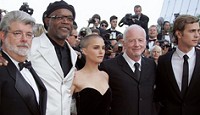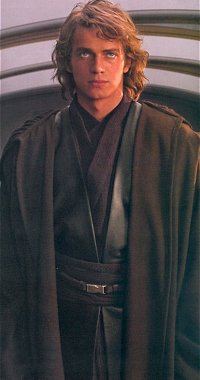 STAR WARS: Meet the Jedi
STAR WARS: Meet the Jedi
THE PREQUELS | THE PHANTOM MENACE | ATTACK OF THE CLONES | REVENGE OF THE SITH | GALLERIES

 But he won't pick a favourite episode. 'The films are like my children, so don't ask me which one I like the best,' he says. The first one is always the toughest one because you don't know what's going on. You're completely confused, it's up to this poor little baby to teach you how to be a parent, and sometimes they're better at it and you have to learn as you go. Everything is a drama, you worry about everything that goes on every day and it drives you nuts. Each little phase is confusing for you, especially when they turn into teenagers. Then you have the next one and the next one, and each time it gets easier and easier because you kind of know what to expect. So by the time you get to the last one it's really a piece of cake. You've been through there so many times that the last one is the one that gets spoiled. But it's very much like that with the movies. The first one was definitely the hardest one and the last one was definitely the easiest one.'
But he won't pick a favourite episode. 'The films are like my children, so don't ask me which one I like the best,' he says. The first one is always the toughest one because you don't know what's going on. You're completely confused, it's up to this poor little baby to teach you how to be a parent, and sometimes they're better at it and you have to learn as you go. Everything is a drama, you worry about everything that goes on every day and it drives you nuts. Each little phase is confusing for you, especially when they turn into teenagers. Then you have the next one and the next one, and each time it gets easier and easier because you kind of know what to expect. So by the time you get to the last one it's really a piece of cake. You've been through there so many times that the last one is the one that gets spoiled. But it's very much like that with the movies. The first one was definitely the hardest one and the last one was definitely the easiest one.'
What about all the marketing tie-ins with these films, especially with sugary and junk food linked with a movie aimed at kids? 'Well, the one that was the most heavily marketed was Episode I, because everyone was afraid it wasn't going to work. So we backed way off on the last one and on this we tried to find a medium. Ultimately, products like Pepsi — you have primarily the issue of sugar, but they have Diet Pepsi — is it bad for you? I don't know. I don't think it is. I grew up on that sort of thing and all it did was make me crazy. We've tried to be careful about the products that we work with. We do have M&Ms — I love them as it turns out — so a lot of it has to do with what we grew up with. We have various breakfast cereals. I know it makes it difficult for parents sometimes, but I don't know what to say about it — it's the world of modern marketing. And in the world of piracy, having movies released on the internet, it's going to get even worse because capturing the attention of the audience out there is getting harder and harder.'
Over the past 30 years, Lucas has watched the industry change drastically. 'It's harder now because of the internet and cell phones that take pictures, and videos,' he says. 'The movies end up on the internet before they end up in the theatres. It used to be that there were real plot twists, important things that needed to be held back so that people could enjoy the picture. But in this one, we brought the book out ahead of time, we got the video game out ahead of time. They all explore the universe completely, and most of the story has been told — this is just the final piece of the puzzle. So it's not like you don't know what happens. You know he turns into Darth Vader!'
He feels like piracy the biggest threat to the film industry today. 'I'm glad I'm getting out when I can, because it's not going to be the same in the next few years. It's going to be very much worse. I don't know how they'll survive, seriously. If it wasn't for DVD there would be no theatrical film industry. And as DVD gets whittled away with piracy, there won't be any income, so you're going to see smaller and smaller and smaller movies, and eventually something else will take its place. I'm not sure what that will be, whether it'll be straight-to-video. People will always want the theatrical experience, just like they go to the opera or the ballet. People will still go to movie theatres just because they want the social interaction with other people, but I have a feeling that films will be released on the internet and in theatres at exactly the same time. There will be some kind of coded pay-per-view methodology. That's the only way to stop piracy if they're selling it on the street for $2.'
So what about the future of Star Wars? Will there be another new version of the saga released in a box set every few years? 'A lot of it depends on the medium,' Lucas says. 'You've got to remember that when Star Wars came out there wasn't even VHS — there wasn't anything, it was a whole different world. So we are releasing Episode III at Christmas, but when the six-pack comes out I'm not sure. We may wait until it gets in high-def and we can release it as a six-pack in high-def. That's been discussed.
'But it's hard to know what the next level is. Eventually it's all going to go online, there's no question about that. I've seen a 3D process that's quite amazing and it really makes Star Wars look good. It's a three-dimensionalisation of the film, but it's not like a 3D movie where things are poked in your eyes and stuff. It's a different way of looking at the movie. I've never been a big fan of 3D but in this process I've become quite a convert. So if we can get digital theatres, because it needs them in order to work, we will probably re-issue all of the movies in theatres in 3D because it's such a cool process.'
Other than this, he doesn't see himself tinkering any more with the films. 'The real issue is that Episode IV was never finished,' he says. 'I didn't have the money, I didn't have the time, I didn't have the technology to actually finish it, and at the time I was kind of upset about it. People were going, "It's marvellous, how do you feel about it?" And I was like, "I feel about it's 50 or 60 percent of what I wanted, I'm really disappointed, I'm really sad, it bothers me to watch it." And to a minor degree, that was true on the next two films, partly because I was financing them myself, and they were more complicated. I did those films in a special edition to kind of finish them off the way I meant them to be. If nothing else, I'm stubborn, dogmatic and persistent to get the movie the way I wanted to get it.
'The last three I've pretty much been able to make them the way I want. I haven't had much interference, I've spent as much as I've needed to spend to make them work, so now the whole thing is complete and it's pretty much the way I want it to be, so I'm not really going to bother with them.'
Which frees him to focus on other projects, such as a film about the Red Tails, African-American fighter pilots during the second World War. 'They're sometimes referred to as the Tuskegee Airmen because that's where they trained, in Tuskegee,' he says. 'They were the only fighter unit during World War II that never lost a bomber, because they were escort fighters. They were the best. It obviously involves racial issues, but mostly it's about a bunch of guys who wanted to become fighter pilots. And it's a flying movie! They went up against messerschmits, the new jets. And it's really an exciting story, because they're all like 20 years old, young guys, and most of them are college-educated. They went on to become the captains of industry in the United States, and it's a pretty inspiring story. I've been working on it for about 15 years and now I'm just going to focus on it, along with the next Indiana Jones.'
When he looks back at the past 30 years, he's clearly a little overwhelmed at where Star Wars has brought him, from the impact of the films themselves to all the merchandising and tie-in products. They're obviously still a very personal thing for him — something that's come from his imagination. So how does he feel about the people who lampoon Star Wars?
He smiles, just thinking about it: 'There's been a lot of great send-ups and parodies. There's been some great ones over here. It's part of the fun. We used to say we were making the movies to be parodied in Mad magazine — that's the only reason we're here. But it's been all kinds of programming and even Mel Brooks films. It's fun. I always wanted to do two versions of the movie, right from the very beginning. But I never really got to do it. I always wanted to do an extra take, which was a comedy take, so then I could cut together the whole movie as a comedy. But you always get there and the chance to do that other take never materialised in the real world. I always hoped to do the goofy version of Star Wars, so I'm glad other people are able to do it.'


HAYDEN CHRISTENSEN FILMOGRAPHY
The Decameron (2006)
Star Wars Episode III:
Revenge of the Sith (2005)
Shattered Glass (2003)
Star Wars Episode II:
Attack of the Clones (2002)
Life as a House (2001)
The Virgin Suicides (1999)
Free Fall (1999)
Strike! (1998)
Street Law (1995)
In the Mouth of Madness (1994)






